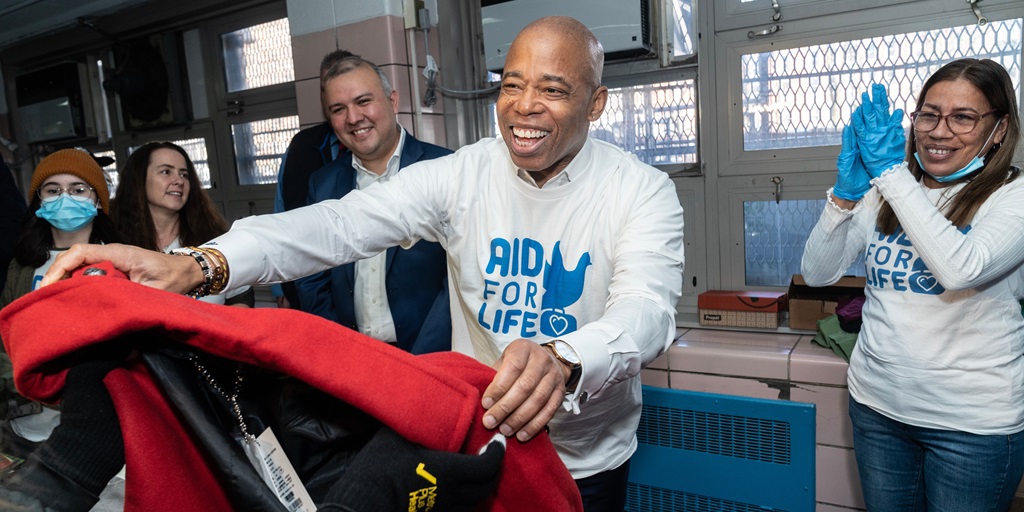Many migrants, after being released from government custody, resettle in interior communities. These individuals and families often need immediate support in the form of housing, food, and clothing, frequently lack documentation from their country of origin, and have limited understanding of their immigration status in the United States.
Many come ready and eager to work. But one of the primary barriers preventing them from doing so and achieving self-sufficiency in the short term is lack of work authorization.
Some migrants are eligible to apply for a work permit upon arrival – like those admitted into the U.S. through the parole processes for nationals of Cuba, Haiti, Nicaragua, and Venezuela (CHNV) – while many others must first submit an asylum application and wait a subsequent minimum of 180 days before applying for work authorization.
In the face of these challenges, communities across the country, ranging from New York City to Denver, are stepping up to help migrants address barriers to work authorization. While cities are on the front lines of this welcoming effort, state governments have a key role to play in marshaling resources and coordinating multi-sector partners involved in the response.
States like Massachusetts, Illinois, New York, and New Jersey – all of which have Offices of New Americans – have invested resources to help migrants apply for work authorization and other legal status. One innovative model that states are pursuing is resource clinics. These clinics bring together local, state, and federal government agencies along with legal and direct service providers to create a one-stop style event where new arrivals can receive free legal advice and support with submitting their Application for Employment Authorization.
With record-low unemployment rates across the country and employers struggling to find workers in key industries, the benefits of work authorization go far beyond the individual and are shared among the broader community.
Beyond the sheer coordination required to stand up and staff these events, a unique feature has been the involvement of federal government partners on-site, including staff from U.S. Citizenship and Immigration Services (USCIS) and the Department of Homeland Security (DHS). The presence of federal agency staff means eligible migrants can complete an application and have it processed at the same location, cutting down on unnecessary processing delays and back-and-forth.
Here are some examples of how states are helping migrants apply for work permits and other relief:
How Massachusetts Is Helping Migrants
The Massachusetts Office for Refugees and Immigrants hosted a clinic in November, leveraging National Guard volunteers as well as a National Guard facility in Reading, MA. The event aimed to address traditional barriers faced by new arrivals by providing transportation from shelters facing overcrowding and language interpretation, in addition to legal services. USCIS and DHS provided support to accept and process applications at the event.
How Illinois Is Helping Migrants
Illinois is taking a multi-tiered approach to address barriers to work authorization while also dealing with limited shelter capacity difficulties in Chicago and throughout the state.
With winter approaching, Governor Pritzker announced $30 million in state funds to establish an intake center and $65 million to set up a tent base camp which will house an additional 2,000 migrants. The state hopes to curtail migrants being dropped by buses from the border in the streets of Chicago and coordinate a more humanitarian, comprehensive approach. The state has also invested $65 million for other wrap-around services, including legal assistance required to provide migrants with access to work authorization.
How New York Is Helping Migrants
New York, the most heavily impacted state to date, has undertaken an exhaustive effort to help the new arrivals, many of whom are Venezuelan, apply for Temporary Protected Status (TPS). If granted, TPS provides work authorization and renewable lawful status.
Since October, the state, in collaboration with local and federal partners, has helped submit 5,500 work authorization and TPS applications statewide through a surge of personnel and resources, including National Guard corps, legal services, nonprofits, and additional caseworkers at NYC Health + Hospitals, a network of health services that accept individuals regardless of immigration status or their ability to pay. With New York City alone receiving over 140,000 migrants since spring 2022, there remains a profound need for even more of these services and resources.
How New Jersey Is Helping Migrants
The New Jersey Department of Human Services (where the state’s Office of New Americans is housed) and the New Jersey Department of Labor and Workforce Development collaborated to invest $2.5 million in federal funds to raise awareness about the work authorization application process and provide application support. The agencies also launched web portals to match new arrivals looking for work with employers with job opportunities.
Over the next few months, the Department’s Office of New Americans will develop outreach, education, and application assistance efforts to reach immigrants who are immediately eligible to apply for a work permit.
Overall, despite many challenges with an immigration system that causes backlogs, delays, and gaps for individuals struggling to resettle here, state governments, in collaboration with local and federal partners, have identified work authorization as the key to success for new arrivals and the communities where they reside. Together, these partners are actively seeking solutions, fostering partnerships, and connecting migrants to the resources they need to begin contributing to their communities.
FILED UNDER: Illinois, Massachusetts, New Jersey, New York













